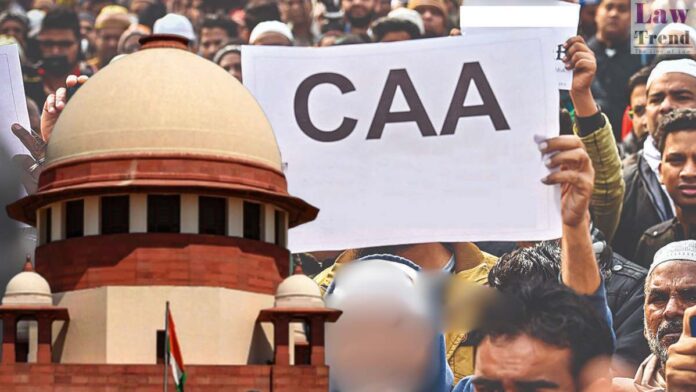The Supreme Court commenced hearings today on over 200 petitions filed against the Citizenship Amendment Act (CAA) from across the nation. The court, for the moment, has declined to place any stay on the CAA and has asked the Central Government to respond within three weeks. During the proceedings, Chief Justice of India (CJI) inquired from the Central Government the time it would require to respond to the petitions demanding a stay on the notification. The Solicitor General, representing the Centre, sought four weeks; however, the court granted three weeks to file the response, with the next hearing scheduled for April 9.
Senior advocate Kapil Sibal, representing one of the petitioners, opposed the time granted to the Centre. He pointed out that it has been four years since the CAA was passed and argued that once citizenship is granted, it would be difficult to retract, rendering the petitions ineffective. Sibal advocated for a stay on the notification, emphasizing that there’s no urgency after four years.
Another advocate for the petitioners, Indira Jaising, demanded a stay on the CAA and suggested that the matter should be referred to a larger bench. However, the CJI noted that the Centre deserved some time to respond, considering it had sought an extension.
The Chief Justice stated that cases related to Assam would be heard separately, in line with previous orders. One of the lawyers highlighted that certain tribal areas in Assam, as per section 6B(4) of the CAA, would not be affected by the act. It was clarified that not the entire state but only those parts included in the Sixth Schedule are exempt from the CAA.
Also Read
The Supreme Court’s directive to the Central Government to respond within three weeks has set the stage for the next hearing on April 9. Senior advocate Kapil Sibal stressed the seriousness of the constitutional issues at hand, while another lawyer, Ranjit Kumar, representing migrants, highlighted the plight of those who have fled persecution from regions like Balochistan. The implications of granting citizenship and the rights it entails, such as voting, were also discussed, underscoring the wide-ranging impact of the CAA.




